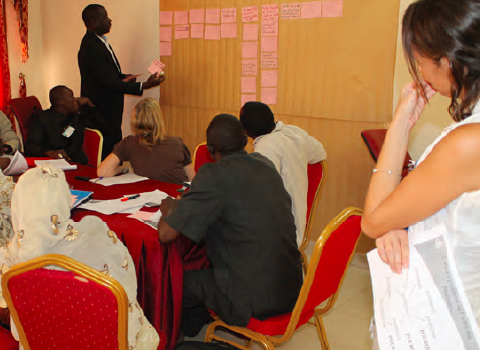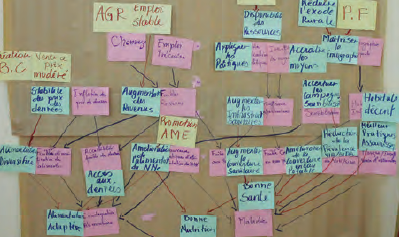Building understanding and capacity for integrating food security and nutrition approaches to address widespread child undernutrition in Niger
 Solange Heise
Solange Heise
Solange Heise is the Food Security and Nutrition Officer at the FAO representation in Niger.
Background
Niger, a landlocked country in the Sahel of West Africa, is regularly confronted with acute and chronic food insecurity and nutrition crises. The results of a national nutrition survey conducted in November 2013 indicated that over 4 million people, approximately 23% of the population, were food insecure. Additionally, stunting, (low height for age) was 53% and global acute malnutrition (GAM) was found to be 14.3% . Despite the poor nutrition situation, Niger has made important progress nationally to address its nutrition problems.
There is also political commitment to integrate food security and nutrition issues within the country. In 2012, Niger launched the 3N Initiative (Les Nigériens Nourrissent les Nigériens – Nigeriens Nourish Nigeriens). This is a multi-sectoral strategy designed to empower Nigeriens to improve food and nutrition security, with an emphasis on sustainable food production. The 3N initiative is a bottom-up approach, which encourages local civil society, and grassroots organizations within the municipalities to assess their own needs and put forward proposals for government assistance. Furthermore, in 2011, Niger joined the Scaling Up Nutrition (SUN) movement and REACH (Renewed Effort against Child Hunger), two major initiatives to support the Government in the implementation of its multi-sectoral nutrition strategy and the scale-up of food and nutrition actions.
Despite the many good initiatives linking food security and nutrition in policy and assessment, challenges remain in joint planning and implementation. Continued efforts are required to develop technical expertise to actually transform these initiatives into integrated approaches on the ground.
To this effect, a regional workshop for Sahelian countries was held in Senegal in June 2014. The workshop was hosted by the UN Food and Agriculture Organisation (FAO), in collaboration with several humanitarian organizations working in food security and nutrition as part of an ECHO funded project "Strengthening food security capacity". Representatives from Chad, Senegal, Mali, Niger and Burkina Faso attended. The focus was on addressing the challenges of integrating nutrition and food security programmes in emergency situations and building nutrition resilience. Following the workshop, each country was assigned to conduct a similar workshop in their own country. In Niger, a three-day workshop was held in Niamey in October 2014 at which 50 people working in the areas of nutrition, agriculture, livestock, water, sanitation and hygiene (WASH), education and the media participated. The majority of participants were government staff.
Key learning and experiences
The workshop consisted of a very lively and participatory exchange of views and ideas around the various causes of undernutrition. The participants built problem and solution trees, identifying the determinants of undernutrition for major vulnerable livelihood groups in Niger (pastoralist, agro-pastoralists, agriculturalist and petty traders). Participants discussed and identified potential interventions to address specific issues, using available data and their expertise. The workshop highlighted that nutrition should be addressed through multi-sectoral policies and programmes and mainstreamed in relevant sectoral strategies.
Participants recognized that in order to design programmes through a ‘nutrition lens’, they needed to understand the causes of undernutrition, assess the situation accurately, target the most nutritionally vulnerable and involve communities from the early stages of design.
Participants identified the following actions to concretely integrate nutrition in other sectors in Niger:
- Improve coordination between sectors, at national, state and county levels, which could be supported by enhanced coordination between the Food Security, WASH and Nutrition Clusters
- Implement joint activities such as cooking demonstrations based on local recipes, school gardens, provision of inputs for food diversification, production of nutrient-rich crop varieties, and behaviour change communication
- Collect information such as household dietary diversity, cultural norms, and feeding practices
- Improve analysis of available data (e.g. joint assessments) by conducting it jointly with representatives of other sectors
- Build capacity at different levels including strengthening capacity of community networks – including youth and women
- Incorporate gender and accountability into all projects
Participants acknowledged that the workshop was extremely useful and helped them to better understand the nutrition situation and nutrition coordination in Niger and to identify how they could maximize the nutritional impacts of existing food security and livelihoods programmes.
 Challenges and Recommendations
Challenges and Recommendations
Despite the positive feedback of participants on the workshop, practically mainstreaming nutrition in sectors other than health in Niger is challenging. It was noted that the numerous existing coordination mechanisms tend to be sectoral, technical and focus mainly on emergency issues, even if development issues are also addressed. To support the rollout of mainstreaming nutrition in Niger, participants recommended that the 3N Initiative develop a forum to discuss nutrition-sensitive agricultural and food security programmes at national and local levels. Participants also suggested the development of a multi-sectoral nutrition plan.
Furthermore, the discrepancy between the significant resources allocated to treatment programmes in emergencies compared to long-term prevention programmes was highlighted. Participants recommended increased advocacy to donors requesting funding for long-term programmes in addition to maintaining the funding for treatment programmes.
Next steps
At the end of the workshop, participants identified three next steps:
- Report back to their organizations on the outcomes of the workshop
- Advocate for more nutrition-sensitive approaches in their work
- Document and share their good practices and experiences with others actors through clusters or technical working groups
FAO Niger will continue, in collaboration with 3N and REACH, to strengthen the individual and the organizational capacity to integrate nutrition and food security at all levels. To address this, three further regional workshops are planned for 2015.
Additionally, FAO Niger will continue to advocate for the integration of nutrition sensitive approaches at the national level, particularly through the review and the adoption of the national nutrition policy and the elaboration of a multi-sectoral nutrition plan.
